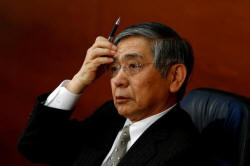|
BOJ holds off on easing
despite weak inflation, sparks yen spike
 Send a link to a friend
Send a link to a friend
 [June 16, 2016]
By Leika Kihara and Stanley White [June 16, 2016]
By Leika Kihara and Stanley White
TOKYO (Reuters) - The Bank of Japan
refrained from offering additional monetary stimulus on Thursday despite
anemic inflation and weak global growth, sending the yen spiking to a
two-year high that clouds an already darkening outlook for the economy.
While the decision came as no big surprise, it emboldened yen bulls who
were already selling the dollar after the Federal Reserve held off on
raising interest rates on Wednesday and grew more cautious about
prospects for U.S. growth.
BOJ Governor Haruhiko Kuroda joined a chorus of jawboning by Japanese
policymakers aimed at dissuading investors from pushing up the yen too
much, stressing his readiness to ease policy again if excessive yen
gains threaten prospects for achieving the bank's ambitious 2 percent
inflation target.
He also said the BOJ is in close contact with other central banks,
including the Bank of England, on contingency plans to soothe financial
markets should Britain vote to leave the European Union at next week's
referendum.
With polls showing the "Leave" camp pushing ahead, few had expected the
BOJ to risk easing policy before the June 23 vote.
"If events like a Brexit vote disrupt dollar procurement of Japanese or
any other countries' banks, we have ample tools available to deal with
it," Kuroda told a news conference.
The BOJ maintained its massive asset buying program at its two-day rate
review that ended on Thursday, pledging to increase base money at an
annual pace of 80 trillion yen ($753 billion).

It also left unchanged a controversial 0.1 percent negative interest
rate applied to some of the excess reserves financial institutions park
with the central bank.
"There is nothing in recent economic indicators that would lead the BOJ
to change its economic outlook now," said Norio Miyagawa, senior
economist at Mizuho Securities.
"However, the rising yen will place more downward pressure on consumer
prices, so I expect the BOJ to ease in July, using all three dimensions
of its current policy framework," referring to the options of buying
more bonds, taking on more risk by topping up other asset purchases and
deepening negative rates.
The yen surged broadly after the BOJ's decision, hitting a 22-month high
of 104.06 yen to the dollar and multi-year highs against the euro and
sterling. The Nikkei stock average lost 3.1 percent to close at a
four-month low.
A Brexit may push up the yen further as investors buy the currency as a
safe haven. That adds to headaches for Japanese policymakers, who fret
of the hit to exports already suffering from soft global demand.
A strong yen also weighs on inflation by pushing down import costs. Core
consumer prices fell for the second straight month in April as weak
consumption discouraged firms from raising prices, stoking fears Japan
was reverting to deflation.
[to top of second column] |

Bank of Japan Governor Haruhiko Kuroda gestures during a news
conference in Tokyo, Japan, April 28, 2016. REUTERS/Thomas
Peter/File Photo

"Yen rises, as we're seeing now, could have undesirable effects on Japan's
economy and future inflation," Kuroda said, issuing his strongest warning to
date of the damage recent yen gains could have on the economy.
NO HELP FROM FED
A Reuters poll last week showed economists see a much higher chance of the BOJ
easing at its meeting on July 28-29, when it issues fresh quarterly growth and
inflation forecasts, assuming that global markets remain stable.
"If the British referendum pushes the yen above 100 to the dollar, the BOJ would
ease further given damage it would cause to exporters' profits," said Hideo
Kumano, chief economist at Dai-ichi Life Research Institute.
Analysts at ANZ wrote in a research note that the BOJ could announce an increase
in asset purchases by up to 20 trillion yen and a further deepening of negative
rates in July.
The BOJ is in a bind. Despite nearly three years of aggressive money printing,
inflation has ground to a halt.
In addition, receding expectations of a near-term U.S. rate hike have dashed the
BOJ's hopes of getting help from Fed policy to keep sharp yen rises at bay.
While Kuroda argues he has plenty of ammunition to ease further, some BOJ
officials have openly voiced doubts on what more the central bank can deliver
and whether it would be any more successful than earlier stimulus efforts.
Japan's 10-year government bond yield fell to a record low of minus 0.210
percent on Thursday, casting doubts on what more the BOJ can do to slash already
low borrowing costs.
(Additional reporting by Minami Funakoshi and Tetsushi Kajimoto; Editing by Kim
Coghill and Eric Meijer)
[© 2016 Thomson Reuters. All rights
reserved.] Copyright 2016 Reuters. All rights reserved. This material may not be published,
broadcast, rewritten or redistributed.
 |